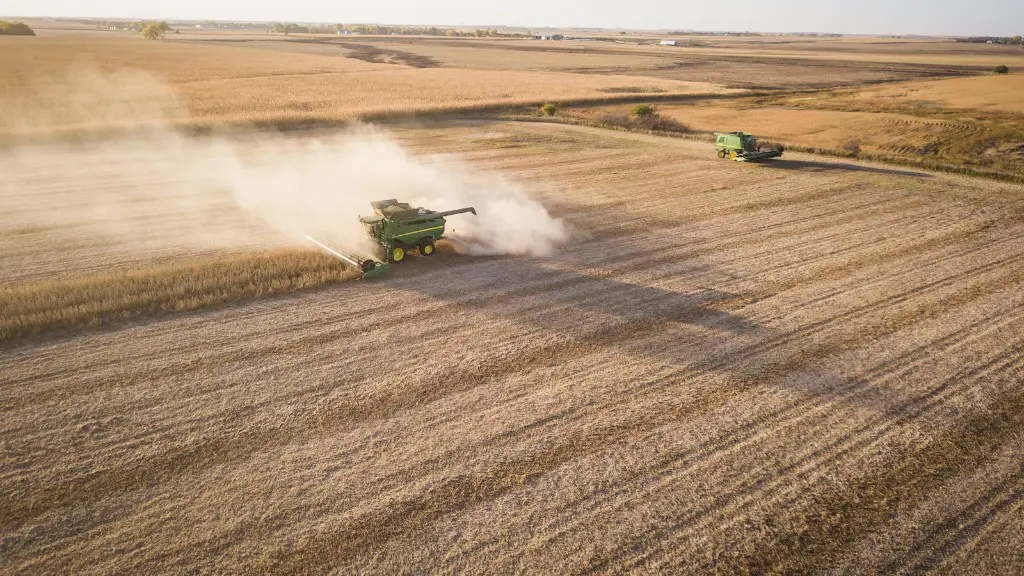Agriculture is the science and art of growing plants, animals and microorganisms for the benefit of mankind. There are certain requirements that need to be fulfilled in order to make sure that agricultural activities can be effectively and efficiently carried out. These requirements are categorized into two main parts: physical and managerial.
Physical requirements involve climatic parameters such as temperature, rainfall, soil fertility. It should be noted that the right combination of these parameters will result in optimal crop production. Moreover, a suitable topography is also essential for agricultural activities. For instance, slopes and contours should be identified in order to properly channel water and fertilizer to the crops.
The managerial requirements entail the implementation of appropriate scientific techniques. Research and innovation are essential components of successful agriculture. Through pioneering research, new techniques and technologies can be identified and adapted to produce higher yields. On the other hand, proper management should also be employed to cater for environmental factors. This includes pest infestations, weeds and diseases.
In addition, efficient use of resources should also be a priority. This includes water, nutrients, land and labor. Water should be allocated carefully as is it key for crop growth. Furthermore, the soil should be properly fertilized in order to improve its fertility. By leveraging these resources, the crop production can be maximized.
To conclude, these are the basic requirements for agricultural activities. Proper physical and managerial techniques need to be implemented in order for agricultural activities to be carried out successfully. By strategically utilizing available resources, crop productions can greatly be improved.
Technological Advancements
The advancements in technology can also be used to improve agricultural activities. One of the biggest technological breakthroughs is the use of drones. Drones can be used to survey and monitor the land in order to look for areas of potential growth or nutrients deficiency. Moreover, modern precision agriculture entails the use of sophisticated machines and equipment to monitor and control the agricultural process. This includes applications such as irrigation control, soil monitoring and crop identification.
Moreover, analytics can be used to monitor crop production and predict areas that need more attention. This involves the use of sensors and smart devices which record data on a daily basis. Furthermore, images can be captured regularly to determine the condition of the crops and identify any possible diseases or deficiencies. This data can then be analyzed and used to make decisions that benefit the crop production.
Finally, modern communication technologies can also be used for agricultural activities. This includes the use of cloud-based applications to monitor data in real-time. Additionally, mobile and web applications can be used to provide updates, send alerts and connect people from the agricultural sector. By leveraging these technologies, farmers, researchers and the general public can all be better informed and engaged in the agricultural process.
Financial Requirements
Apart from the technical requirements, financial components should also be taken into consideration. Agricultural resources such as land, machines and tools are expensive to secure. This is true for small farmers who may not have adequate resources to invest in these components. Furthermore, government incentives should also be investigated. These incentives help offset the costs associated with agricultural investments and provide financial support in certain areas.
Moreover, adequate legal services should also be employed in order to protect the interests of the farmers. Lawyers can provide advice on legal matters such as policy implementation, dispute resolution and protection of property rights. Without these services, small farmers are at risk of exploitation and unfairness. As such, proper financial measures should be taken.
In addition, education and training should also be accessible to the farmers. This encompasses a variety of topics such as business management, crop management, pest detection and even safety measures. This education can prove to be invaluable in maximising crop production. Furthermore, new techniques and emerging opportunities should be shared to help the farmers remain competitive.
To conclude, these financial requirements are crucial for agricultural activities. Without them, farmers and investors can be vulnerable to exploitation and harsh conditions. This is why adequate resources should be allocated to cater for these requirements. Through these investments, agricultural activities can be optimised and properly managed.
Environmental Impacts
Agriculture can often have negative impacts on the environment due to the use of chemicals such as pesticides and fertilizers. As such, proper regulations should be implemented by governing bodies to monitor and mitigate these impacts. This can involve the removal of hazardous chemicals, monitoring of pollutants and the use of organic fertilizers instead.
Moreover, the water sources used in irrigation should also be taken into consideration. In many areas, the water supply is becoming increasingly limited. If this water is not used wisely, then it can easily be polluted and cause harm to the environment. As such, effective water management should be enforced. This can include recycling water and using natural channels for irrigation.
In addition, the introduction of renewable energy sources can also have positive impacts. This may include the use of solar, wind or geothermal energy. By using renewable sources, the reliance on fossil fuels can be reduced and pollution severely minimised. Furthermore, the use of greenhouses and vertical farming techniques can keep pollution and energy expenditures to a minimum.
Finally, environmental education should also be encouraged as it can improve the understanding of the surrounding environment. This can involve the teaching of sustainable and safe farming techniques, water management and green energy sources. Through this education, farmers can get a better sense of how to use resources responsibly and how they can benefit the environment.
To conclude, these environmental requirements are essential for the success of agricultural activities. Proper regulations and techniques should be implemented in order to protect the land from pollutants and hazardous chemicals. Moreover, renewable energy sources can help reduce the pressure on the environment and introduce more sustainable practices.
Social Components
A key component of successful agricultural activities is the need to involve the local community. This may involve ensuring workers’ rights are being respected and labour conditions are fair. Furthermore, the community should be provided with adequate housing, sanitation and medical facilities. This helps maintain a safe and healthy consumer-farmer relationship and encourages loyalty within the sector.
Moreover, access to education should also be granted to those involved in the agricultural sector. This includes both primary and secondary level education, as well as technical training. Through these institutions, farmers can learn the necessary skills to maximise crop production and make more informed decisions. Additionally, access to government subsidies should also be allowed in order to promote growth and reduce financial burdens on farmers.
In addition, transparency and integrity should be upheld throughout the process. This means keeping accurate records and providing clear information regarding pricing and profits. This also involves using effective communication tools and establishing protocols for dealing with disputes. Without these measures, it can be impossible for the agricultural sector to run smoothly.
Finally, the local community should be actively included in decision-making. This financial accountability is essential for trust-building, as it helps ensure that farmers are getting a fair deal. Moreover, it also helps promote a sense of ownership within the agriculture sector. Through this social interaction, the interests of both the farmers and consumers can be maintained.
To conclude, these social requirements are essential for sustainable agricultural activities. By incorporating the local community and providing them with the necessary infrastructure, trust-building and confidence can be improved. Additionally, making sure that regulations are followed and information is accurate provides a more secure basis for agricultural investments.





